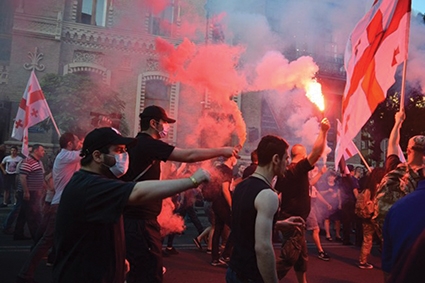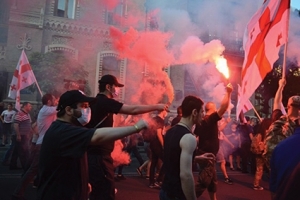Out with the Russian Framework: the Untold Story of the Georgian March
Op-Ed
On July 13, members of various conservatist, nationalist and ultra-nationalist groups, alongside numerous regular citizens, marched in Tbilisi with pretty unpopular demands that irritated Georgia’s so called liberal elite. In response to the “Georgian March,” on July 23, a counter-strike was held by the Movement for Liberty - European Georgia that united representatives of various political powers and social movements protesting against what they believed to be an expression of fascist and xenophobic attitudes. The majority of international experts and actors condemned the Georgian March as a negative that could affect the country’s image and push away potential investors.
And while we may generally agree with the lion’s share of said allegations, there are very important issues that have yet to be openly discussed.
The demands
Beyond populist moves and statements, we can easily outline the three main demands the participants of the Georgian March made: 1) tighten migration laws; 2) deal with harmful practices in clubs/bars managed by migrants; and 3) restrict the activities of foreign-funded NGOs.
Migration is probably one of the most challenging issues that both developed and developing states face. Regardless of whether the targeted migrants represent a small group consisting the local population, or foreigners, what matters is that their number is obviously increasing. Foreign migrants mainly come from Asia or developing countries and work to occupy appreciable and “sensitive” areas – small and medium-sized businesses and the agricultural sector. In the wake of poor social and economic conditions, some citizens are feeling increasingly abandoned and “unprotected” by the government in the face of comparatively financially well-backed migrants. There is nothing more dangerous than this process, as it will undoubtedly lead to a xenophobic backlash, and it is unlikely that focusing on the significant number of Georgians illegally living abroad will somehow solve the problem.
The second Georgian March demand deals with increased facts of prostitution and other dubious activities in various places of entertainment. It is a paradox that while so-called liberal elites advocate rule of law, they rarely recognize that illegal prostitution exists in Georgia and is a common practice in many Turkish and Iranian clubs. Furthermore, there have been cases of child prostitution. This is not the first time the topic has been raised. A few years ago, there were calls to check a number of buildings in the settlement of Gonio, near the border with Turkey, where allegedly illegal prostitution was taking place. The government hushed up the affair. Another challenge is the harmful practice of price exploitation used at the same entertainment venues with the aim of gaining maximum profit from tourists visiting Tbilisi. Such cases often end in threats and fights that can cause significant harm to Georgia’s tourism sector reputation. And while we do not need to focus on the ethnic or national belonging of the owners of said venues, we should recognize the problem and take respective steps before it is too late.
Finally, the march organizers demanded the restriction of activities of foreign-funded NGOs. Georgia’s non-governmental sector has played a crucial role in building democratic institutions and practices. We need to keep this in mind. But, at the same time, we should realize that the third sector has transformed over the years. Nowadays, some current non-governmental movements are so actively involved in the country’s everyday life and, in particular, political processes, that it is sometimes too complicated to draw a clear line between political party, private sector and civil society. The best example is the ongoing constitutional reform where it seems that every single actor, including NGOs and INGOs, is lobbying specific political and business agendas. The issue is even more addled if we recognize the well-established so-called ‘revolving door’ principle in the country (the movement of individuals between positions in the private and the public sectors). So far, it is logical that more and more questions are being raised about the total and absolute dependence of these movements on foreign aid. This issue is nothing new in academic debates abroad, but in Georgia it is still a taboo.
So far, the issues raised by participants of the march are pretty relevant and we need to start debates and discussions even if we do not share the general pathos of the movement. Further, it is crucial to avoid stepping on the same rake twice by avoiding clichés.
What We Shouldn’t Do
There are two important things that we should stop doing if we aspire to building a unified democratic society. First of all, we need to finally abandon the so-called ‘Russian framework’. Secondly, we must stop fragmenting Georgian society into ‘desirable’ and ‘non-desirable’ elements.
The ‘Russian framework’
The Russian way has been a popular political method in Georgia for years. Mikhail Saakashvili and his United National Movement started using it to consolidate society around a ruling government, slandering different “unnecessary” groups and blaming hidden forces for various conspiracy theories. Russia may or may not be involved, but it is evident that blaming the so-called fifth column, Moscow’s intelligence services and other covert organizations, for every unpleasant meeting or riot is guaranteed by default. Unfortunately, the Georgian March was automatically analyzed in the given theoretical framework. By doing so, the government and opponents easily managed to turn a blind eye to the topics raised and, generally, flaws within the existing political order. We may boldly assume that the counter march led by the Movement for Liberty - European Georgia on July 23 with the slogan “No to Russian Fascism” is a continuation of this process. Additionally, it is the reflection of the total inability of Georgian actors to think beyond the ‘Russian framework’ and analyze events based on the current local political, social and economic conditions rather than external factors. Briefly, there is nothing that Georgia’s so called liberal elites can offer except the old “corny” story about Moscow’s menace. We should learn from Russia rather than further contributing to our fears.
‘Desirable’ and ‘non-desirable’ elements
There is widely-shared assumption among Georgian liberals that they are more tolerant than those who belong to conservatist or other movements. But, in fact, this is a more-or-less false statement. Georgian society in general is highly aggressive, non-tolerant toward approaches that to some extent significantly differ from the mainstream and has a tendency of continuous internal destructive confrontation. Furthermore, Georgian society fragments itself into ‘desirable’ and ‘non-desirable’ elements. Local liberal elites are no exception as they automatically create humiliating labels for those people or groups of people who do not share their main postulates regarding NATO and EU integration, Russian politics, immigration laws, land regulations, etc. This is a self-protection mechanism which stimulates a counter-response. As a result, terms such as ‘fascist,’ ‘Nazi,’ ‘traitor’ and other high-flying words are used on a regular basis by all involved parties.
Something similar happened with the Georgian March. Opposed to some arguments, the first unfriendly catchword was thrown by the members of so-called liberal elites and marchers were given a highly hostile reception before, during and after the event. Moreover, whether participants belonged to any particular group or were just citizens dissatisfied with the current state policy, was neither here nor there as they were all by default proclaimed enemies of the State. This was a huge mistake. We need to keep in mind that all that glitters is not gold- not everyone participating in the event belonged to ultra-radical groups with financial assistance from the Kremlin; and, consequently, do not represent ‘non-desirable’ state elements.
What Next?
Georgia’s political and other elites must stop using the ‘Russian framework’ to turn a blind eye to the challenges that such marches raise; they should work hard to start open debates to show their readiness for dialogue and awareness of the existing political, social and economic challenges. Moreover, there should be no further attempts to split society into ‘desirable’ and ‘non-desirable’ groups and elements. The fact that some issues may be or are brought up by questionable groups in a questionable manner does not undermine their importance. Issues expressed by the Georgian March have some logic as well as empirics behind them and we need to talk about them. If not, the existing dissatisfaction will undoubtedly increase and such marches will be seen on a growing basis.
By Archil Sikharulidze
Photo Source: The Georgian March (Luka Pertaia/OC Media)












